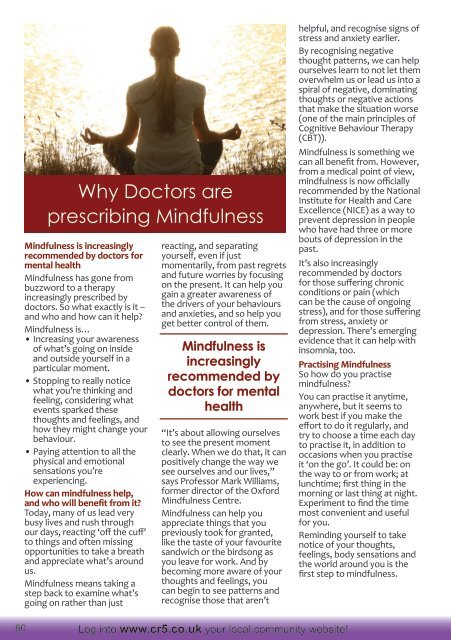CR5 Issue 171 August 2019
A local independent community magazine delivered free to 11,800 homes every month in the CR5 postcode. Contains local business advertising, interesting reads, Competitions, What's on in the Community and Puzzles.
A local independent community magazine delivered free to 11,800 homes every month in the CR5 postcode.
Contains local business advertising, interesting reads, Competitions, What's on in the Community and Puzzles.
Create successful ePaper yourself
Turn your PDF publications into a flip-book with our unique Google optimized e-Paper software.
Why Doctors are<br />
prescribing Mindfulness<br />
Mindfulness is increasingly<br />
recommended by doctors for<br />
mental health<br />
Mindfulness has gone from<br />
buzzword to a therapy<br />
increasingly prescribed by<br />
doctors. So what exactly is it –<br />
and who and how can it help?<br />
Mindfulness is…<br />
• Increasing your awareness<br />
of what’s going on inside<br />
and outside yourself in a<br />
particular moment.<br />
• Stopping to really notice<br />
what you’re thinking and<br />
feeling, considering what<br />
events sparked these<br />
thoughts and feelings, and<br />
how they might change your<br />
behaviour.<br />
• Paying attention to all the<br />
physical and emotional<br />
sensations you’re<br />
experiencing.<br />
How can mindfulness help,<br />
and who will benefit from it?<br />
Today, many of us lead very<br />
busy lives and rush through<br />
our days, reacting ‘off the cuff’<br />
to things and often missing<br />
opportunities to take a breath<br />
and appreciate what’s around<br />
us.<br />
Mindfulness means taking a<br />
step back to examine what’s<br />
going on rather than just<br />
reacting, and separating<br />
yourself, even if just<br />
momentarily, from past regrets<br />
and future worries by focusing<br />
on the present. It can help you<br />
gain a greater awareness of<br />
the drivers of your behaviours<br />
and anxieties, and so help you<br />
get better control of them.<br />
Mindfulness is<br />
increasingly<br />
recommended by<br />
doctors for mental<br />
health<br />
“It’s about allowing ourselves<br />
to see the present moment<br />
clearly. When we do that, it can<br />
positively change the way we<br />
see ourselves and our lives,”<br />
says Professor Mark Williams,<br />
former director of the Oxford<br />
Mindfulness Centre.<br />
Mindfulness can help you<br />
appreciate things that you<br />
previously took for granted,<br />
like the taste of your favourite<br />
sandwich or the birdsong as<br />
you leave for work. And by<br />
becoming more aware of your<br />
thoughts and feelings, you<br />
can begin to see patterns and<br />
recognise those that aren’t<br />
helpful, and recognise signs of<br />
stress and anxiety earlier.<br />
By recognising negative<br />
thought patterns, we can help<br />
ourselves learn to not let them<br />
overwhelm us or lead us into a<br />
spiral of negative, dominating<br />
thoughts or negative actions<br />
that make the situation worse<br />
(one of the main principles of<br />
Cognitive Behaviour Therapy<br />
(CBT)).<br />
Mindfulness is something we<br />
can all benefit from. However,<br />
from a medical point of view,<br />
mindfulness is now officially<br />
recommended by the National<br />
Institute for Health and Care<br />
Excellence (NICE) as a way to<br />
prevent depression in people<br />
who have had three or more<br />
bouts of depression in the<br />
past.<br />
It’s also increasingly<br />
recommended by doctors<br />
for those suffering chronic<br />
conditions or pain (which<br />
can be the cause of ongoing<br />
stress), and for those suffering<br />
from stress, anxiety or<br />
depression. There’s emerging<br />
evidence that it can help with<br />
insomnia, too.<br />
Practising Mindfulness<br />
So how do you practise<br />
mindfulness?<br />
You can practise it anytime,<br />
anywhere, but it seems to<br />
work best if you make the<br />
effort to do it regularly, and<br />
try to choose a time each day<br />
to practise it, in addition to<br />
occasions when you practise<br />
it ‘on the go’. It could be: on<br />
the way to or from work; at<br />
lunchtime; first thing in the<br />
morning or last thing at night.<br />
Experiment to find the time<br />
most convenient and useful<br />
for you.<br />
Reminding yourself to take<br />
notice of your thoughts,<br />
feelings, body sensations and<br />
the world around you is the<br />
first step to mindfulness.<br />
60 Log into www.cr5.co.uk your local community website!
















